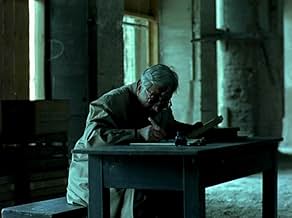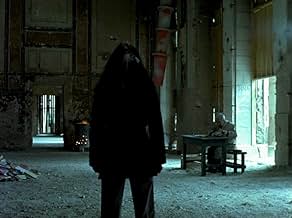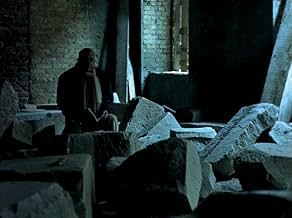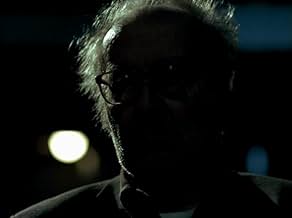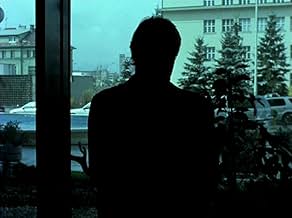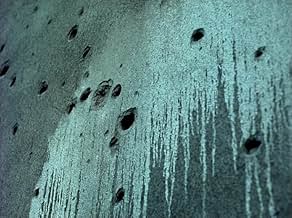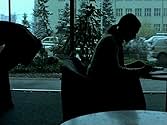Notre musique
- 2004
- Tous publics
- 1h 20m
IMDb RATING
6.8/10
3.2K
YOUR RATING
An indictment of modern times divided into three "kingdoms": "Enfer" ("Hell"), "Purgatoire" ("Purgatory") and "Paradis" ("Paradise").An indictment of modern times divided into three "kingdoms": "Enfer" ("Hell"), "Purgatoire" ("Purgatory") and "Paradis" ("Paradise").An indictment of modern times divided into three "kingdoms": "Enfer" ("Hell"), "Purgatoire" ("Purgatory") and "Paradis" ("Paradise").
- Awards
- 1 win & 6 nominations total
- Director
- Writer
- All cast & crew
- Production, box office & more at IMDbPro
Featured reviews
Some film critics, like Stuart Klawans of "The Nation" magazine, Desson Thomson of "The Washington Post," and Manohla Dargis of "The New York Times," have hailed this latest effort from Godard, the undisputed giant of the French New Wave, in glowing terms. I think it's a sloppy little film that wouldn't have seen the light of the big screen thousands of miles from home were it not for the fact that it was made by a legendary director.
"Notre Musique" is divided into three sections: the first (12 minutes) is subtitled "Kingdom 1 Hell" and the last (6 minutes) is called "Kingdom 3 Heaven." The long middle section (62 minutes) is "Kingdom 2 Purgatory." "Hell" is a montage depicting scenes of war battles and the carnage that is created by war - made of clips from documentary archival footage and fictional feature films. "Heaven" is a contemporary shoot in a lush park-like setting next to a lake, where it's peaceable and sunny, a lovely stream meanders through, and a few people frolic about. Both of these brief sequences could easily have been made by film school students.
It's difficult to describe the main middle section. It takes place at an international conference in Sarajevo of intellectuals, literati, journalists, diplomats and arts people. Was it an actual conference or something staged for the film? You can't tell just from watching. Several well known people play themselves, including Godard. But mixed in among them are actors playing roles of people given other names.
There's lots of talk. A number of big ideas are casually put on the table, some intriguing but entirely unexplored (example: "killing a man to defend an idea isn't defending an idea, it's killing a man"), some certainly questionable or debatable (examples: "humane people don't start revolutions, they start libraries or cemeteries," or "if the house is already on fire, it's foolish to try to save the furniture"), others simply false on the face of it (example: "The only serious philosophical problem is suicide").
There are allusions to the Nazis; to the destruction - during the Bosnian war - and recent reconstruction of the nearby ancient Mostar Bridge, first built in 1566; to the perennial middle east problem of Palestine and Israel; to the seeming universality of man's inhumanity to man (example: Native Americans in full tribal regalia standing solemnly alongside the Mostar Bridge).
There is footage wasted on various moving forms of transportation planes, buses, cars, trains, streetcars and on people getting into and out of cars, like typical filler footage in a third rate TV drama from Burbank, CA. And there are little meaningless toss off scenes, like an impassive waiter serving flutes of wine carefully to six people seated around a table, a scene that segues into another, in which a fat male guest intrusively wraps a hammy arm around a shapely impassive waitress and pushes her through a little faux dance. So what's that all about the well off even intellectuals exploiting working people? Who knows.
The best bits occur in a seminar conducted by Godard himself, about the way in which cinema can portray opposite tendencies in human nature and society, what he refers to as "shot" and "reverse shot." He mentions several such polarities, e.g., certainty vs. ambiguity, victim vs. criminal. Another example: Godard asserts that the story of Jews in Israel is fiction, while the story of the Palestinians is documentary. What does that mean? One wonders.
Well, it's true that a larger-than-life romantic aura has developed around the Israelis and their struggle to secure a homeland over the past 60 years, while we think of Palestinians instead in undramatic, concrete terms of poverty, joblessness, lack of infrastructure, ineffective leadership, and so on.
Regarding cinema, Godard's comments made me think of scenes from the recent propagandistic documentary about Hugo Chavez and Venezuela, "The Revolution Will Not be Televised." In that film there is a sequence in which shots are fired from a bridge into a crowd below. Viewed from one angle, the scene invites the interpretation that opposition snipers are firing on a pro-Chavez crowd, but, viewed from another angle, the opposite conclusion is possible: that Chavez's people are shooting at opposition protesters. What is the truth? Both versions? Neither?
Animating this theme further are two young women who seem also to represent opposites. There is Judith Lerner (played by actress Sarah Adler), an Israeli journalist who chooses to live in Palestine. She has come to Sarajevo because "I wanted to see a place where reconciliation seems possible." Judith is an optimist. On the other hand we have Olga (Nade Dieu) who is depressed and suicidal, despite her comfortable life. She holds herself back from suicide only because she fears pain and the next world. In the end she is shot by marksmen, we are told, and we rejoin her in the final Heaven sequence.
I do agree with Godard that Purgatory could easily be imagined as a place where endless pseudo-intellectual blather keeps confusing and mesmerizing people, to their detriment. It's the sort of place that people who conduct themselves in this manner during life deserve to be stuck in for the hereafter. Talk is cheap and yet sometimes it has the power to move whole nations toward war or self destruction. Is this what he's driving at? Who can tell?
The only basis for recommending this film is that it is the creation of one of the great filmmakers of the last 50 years, and we owe Godard this respect, to observe any new work of his, approaching it soberly and with openness. But we are not required to genuflect to the master, casting a blind eye toward mediocrity. (In French, Arabic, English, Hebrew, Serbo-Croatian & Spanish) My rating: 6/10 (B-). (Film seen on 02/07/05). If you'd like to read more of my reviews, send me a message for directions to my websites.
"Notre Musique" is divided into three sections: the first (12 minutes) is subtitled "Kingdom 1 Hell" and the last (6 minutes) is called "Kingdom 3 Heaven." The long middle section (62 minutes) is "Kingdom 2 Purgatory." "Hell" is a montage depicting scenes of war battles and the carnage that is created by war - made of clips from documentary archival footage and fictional feature films. "Heaven" is a contemporary shoot in a lush park-like setting next to a lake, where it's peaceable and sunny, a lovely stream meanders through, and a few people frolic about. Both of these brief sequences could easily have been made by film school students.
It's difficult to describe the main middle section. It takes place at an international conference in Sarajevo of intellectuals, literati, journalists, diplomats and arts people. Was it an actual conference or something staged for the film? You can't tell just from watching. Several well known people play themselves, including Godard. But mixed in among them are actors playing roles of people given other names.
There's lots of talk. A number of big ideas are casually put on the table, some intriguing but entirely unexplored (example: "killing a man to defend an idea isn't defending an idea, it's killing a man"), some certainly questionable or debatable (examples: "humane people don't start revolutions, they start libraries or cemeteries," or "if the house is already on fire, it's foolish to try to save the furniture"), others simply false on the face of it (example: "The only serious philosophical problem is suicide").
There are allusions to the Nazis; to the destruction - during the Bosnian war - and recent reconstruction of the nearby ancient Mostar Bridge, first built in 1566; to the perennial middle east problem of Palestine and Israel; to the seeming universality of man's inhumanity to man (example: Native Americans in full tribal regalia standing solemnly alongside the Mostar Bridge).
There is footage wasted on various moving forms of transportation planes, buses, cars, trains, streetcars and on people getting into and out of cars, like typical filler footage in a third rate TV drama from Burbank, CA. And there are little meaningless toss off scenes, like an impassive waiter serving flutes of wine carefully to six people seated around a table, a scene that segues into another, in which a fat male guest intrusively wraps a hammy arm around a shapely impassive waitress and pushes her through a little faux dance. So what's that all about the well off even intellectuals exploiting working people? Who knows.
The best bits occur in a seminar conducted by Godard himself, about the way in which cinema can portray opposite tendencies in human nature and society, what he refers to as "shot" and "reverse shot." He mentions several such polarities, e.g., certainty vs. ambiguity, victim vs. criminal. Another example: Godard asserts that the story of Jews in Israel is fiction, while the story of the Palestinians is documentary. What does that mean? One wonders.
Well, it's true that a larger-than-life romantic aura has developed around the Israelis and their struggle to secure a homeland over the past 60 years, while we think of Palestinians instead in undramatic, concrete terms of poverty, joblessness, lack of infrastructure, ineffective leadership, and so on.
Regarding cinema, Godard's comments made me think of scenes from the recent propagandistic documentary about Hugo Chavez and Venezuela, "The Revolution Will Not be Televised." In that film there is a sequence in which shots are fired from a bridge into a crowd below. Viewed from one angle, the scene invites the interpretation that opposition snipers are firing on a pro-Chavez crowd, but, viewed from another angle, the opposite conclusion is possible: that Chavez's people are shooting at opposition protesters. What is the truth? Both versions? Neither?
Animating this theme further are two young women who seem also to represent opposites. There is Judith Lerner (played by actress Sarah Adler), an Israeli journalist who chooses to live in Palestine. She has come to Sarajevo because "I wanted to see a place where reconciliation seems possible." Judith is an optimist. On the other hand we have Olga (Nade Dieu) who is depressed and suicidal, despite her comfortable life. She holds herself back from suicide only because she fears pain and the next world. In the end she is shot by marksmen, we are told, and we rejoin her in the final Heaven sequence.
I do agree with Godard that Purgatory could easily be imagined as a place where endless pseudo-intellectual blather keeps confusing and mesmerizing people, to their detriment. It's the sort of place that people who conduct themselves in this manner during life deserve to be stuck in for the hereafter. Talk is cheap and yet sometimes it has the power to move whole nations toward war or self destruction. Is this what he's driving at? Who can tell?
The only basis for recommending this film is that it is the creation of one of the great filmmakers of the last 50 years, and we owe Godard this respect, to observe any new work of his, approaching it soberly and with openness. But we are not required to genuflect to the master, casting a blind eye toward mediocrity. (In French, Arabic, English, Hebrew, Serbo-Croatian & Spanish) My rating: 6/10 (B-). (Film seen on 02/07/05). If you'd like to read more of my reviews, send me a message for directions to my websites.
I've just come back from the cinema and it's raining very hard. But there's the sun, too, which is going down behind the mountains. It's very poetic. But not nearly as poetic as Jean Luc Godard's last film, "Notre Musique".
The movie is divided into three kingdoms: 1 - Enfer, 2 - Purgatoire and 3 - Paradis. The first part of the movie consists in a collage of various war images and situations accompanied by a wonderful music. Some very clever sentences are said off screen, too. "Death can be seen in two different ways: as the possible of the impossible or as the impossible of the possible". The second part shows us the crossed stories of some peoples meeting in Sarajevo for the Book Weeks: J. L. Godard himself, a young Israeli Journalist, a Palestinian and a Spanish poets, A young Hebrew girl with Russian origins, a Hebrew translator with Egyptian origins, some American natives, some natives of Sarajevo and other people speak about their experiences, they wishes, war, peace, poetry, history, life, death, cinema, reconciliation. J.L. Godard gives a lecture to some cinema students and shows them photographs. The third part takes place in paradise and shows us a girl who has been killed in a cinema by Israeli snipers who suspected her of being a terrorist ready to kill herself. She had a red bag with her and people thought it contained a bomb. In fact there were just books in it. The girl wanders near a river and encounters an American marine. Some boys are playing and reading books. Paradise is fenced and guarded by U.S. military forces.
This movie is truly amazing. In fact it is not just a film, it is poetry. In moments like these when cinema industry is dominated by fast, brainless, action-packed movies, it is a real pleasure and mind-freeing experience to see something that beautiful and poetic. This was presented this year in Cannes and didn't get much attention if I remember right. A journalist of "Le Nouvel Observateur" who usually gives very good advices, this time got it wrong saying that "Notre Musique" is a senile work. Not at all. It's the work of a director who has only improved with years and who has reached total serenity and great wisdom. This film does not give you ready-made, simple answers to common questions, it gives you some points which are incredibly interesting to develop and think about. Sarajevo is the ideal place where peoples, histories and cultures mix and sometimes sadly clash. When the young girl is asked "Why Sarajevo?" the touching answer she gives is "Because Palestine. I come from Tel Aviv and wanted to see a place where people can get along in harmony". There's so much to think about this movie. And everything is filmed so well, so limpidly, with such a mastery, you can't stop staring at the screen. "Godard is the only film director in the world" (Freddy Buache)
The movie is divided into three kingdoms: 1 - Enfer, 2 - Purgatoire and 3 - Paradis. The first part of the movie consists in a collage of various war images and situations accompanied by a wonderful music. Some very clever sentences are said off screen, too. "Death can be seen in two different ways: as the possible of the impossible or as the impossible of the possible". The second part shows us the crossed stories of some peoples meeting in Sarajevo for the Book Weeks: J. L. Godard himself, a young Israeli Journalist, a Palestinian and a Spanish poets, A young Hebrew girl with Russian origins, a Hebrew translator with Egyptian origins, some American natives, some natives of Sarajevo and other people speak about their experiences, they wishes, war, peace, poetry, history, life, death, cinema, reconciliation. J.L. Godard gives a lecture to some cinema students and shows them photographs. The third part takes place in paradise and shows us a girl who has been killed in a cinema by Israeli snipers who suspected her of being a terrorist ready to kill herself. She had a red bag with her and people thought it contained a bomb. In fact there were just books in it. The girl wanders near a river and encounters an American marine. Some boys are playing and reading books. Paradise is fenced and guarded by U.S. military forces.
This movie is truly amazing. In fact it is not just a film, it is poetry. In moments like these when cinema industry is dominated by fast, brainless, action-packed movies, it is a real pleasure and mind-freeing experience to see something that beautiful and poetic. This was presented this year in Cannes and didn't get much attention if I remember right. A journalist of "Le Nouvel Observateur" who usually gives very good advices, this time got it wrong saying that "Notre Musique" is a senile work. Not at all. It's the work of a director who has only improved with years and who has reached total serenity and great wisdom. This film does not give you ready-made, simple answers to common questions, it gives you some points which are incredibly interesting to develop and think about. Sarajevo is the ideal place where peoples, histories and cultures mix and sometimes sadly clash. When the young girl is asked "Why Sarajevo?" the touching answer she gives is "Because Palestine. I come from Tel Aviv and wanted to see a place where people can get along in harmony". There's so much to think about this movie. And everything is filmed so well, so limpidly, with such a mastery, you can't stop staring at the screen. "Godard is the only film director in the world" (Freddy Buache)
There are movies to help you relax on a Saturday night and there are movies that stimulate, even if that means asking questions that have no answers. I didn't understand this movie but I still felt stimulated by its questions. I tried so hard to make the connections and I had a lot of trouble. But you don't read Portrait of the Artist as a Young Man once without discussing it and expect to understand it. Nor is the more accessible Three Colors Trilogy meant to be seen only once for complete understanding. The quality of a movie is not determined by its accessibility. It's a limited understanding of the medium to judge film by its accessibility. It can be more than an easy way to relax. It can be the impetus to dialogue. I cared about this movie because I didn't understand it.
When you go on holiday, do you ever say, "Oh Look! Look at that"? How does sharing it make it different for us? How is the experience lessened when we don't have another person there?
A scientist measures position and momentum of a particle, but no matter how accurate the measurements, there is always an uncertainty in the results. This Nobel Prize theory is known as 'Heisenberg's uncertainty principle' and has profound implications for physics and philosophy. (At the atomic and sub-atomic level, an act of observation noticeably affects what is being observed.)
Godard mentions Heisenberg through one of his (Heisenberg's) anecdotes. Godard's main interest is funnelled through the cinematic device of shot/reverse angle shot. He examines how it can enlarge understanding of deeper issues. In Notre Musique, Godard is protagonist not for political ideology or social comment. He is flag-bearer. For film. For poetry. For film-as-poetry. Like Maya Deren in her copious writings on cinematic theory, he shoulders the burden of artist-filmmaker with all seriousness, proffering a new language. A different way to view the world. He becomes the lens. We make it our camera.
"Heisenberg and Bohr," he says, "were walking in the Danish countryside, talking about physics. They come to Elsinore Castle. The German scientist said, 'Oh, there's nothing special about this castle.' The Danish physicist said, 'Yes, but if you say, "Hamlet's Castle," then it becomes special.'
Godard stars as himself in this mix of documentary, fiction and montage. He is speaking about on text and image, at the European Literary Encounters Conference in Bosnia. In the Heisenberg story, 'Hamlet's Castle' becomes a literary 'shot/reverse shot.' Godard concerns us with the power of romanticism. His takes on Israeli-Palestinian conflict are refreshingly non-judgemental. Notre Musique calls for a revolution of creative force, "that reinforces memory, clarifies dreams and gives substance to images." Continuing his discourse on the power of the 'real' and the 'poetic,' Godard explains how, "the Jews become the stuff of fiction: the Palestinians, of documentary." (Look at the cinematic output of both, and how Palestinians are defined largely in relation to Israel.)
One storyline concerns two young girls visiting Sarajevo – a place 'where reconciliation seems possible.' Judith is an Israeli journalist. She interviews, among others, Palestinian intellectual and celebrated poet, Mahmoud Darwich. (In Darwich's work, Palestine becomes a metaphor for the loss of Eden, for birth and resurrection, and for the anguish of dispossession. As with Heisenberg, this contextual reference is not explained in the film itself. Understanding them is not essential but does enrich the enjoyment of Notre Musique. ) Also at the Encounters is Olga, a Jewish-French student of Russian descent. She videos Godard's lecture and tries to give him a copy. In some ways, she is an alter-ego, a 'shot/reverse shot' of Judith.
The concept of dialogue (in a non-verbal sense) is developed as Godard critiques 'shot/reverse shot' as part of his lecture. This cinematic device, usually used when two people are talking to each other, reverses the camera so we see each person seemingly from the other's viewpoint as they speak. The angle provides a mental continuity for us, even though both people are not on screen together. The actual change in camera angle, now a convention, is not really 180 degrees but anything from 120 to 160. The person is slightly offset, rather than directly facing the camera (which would also appear more confrontational).
Notre Musique is one of Godard's most responsible, articulate and accessible works. Which makes it doubly shameful that many critics failed to expend the minimal energy required to engage with it, preferring instead to give a banal description that belies their clocking-on superficiality, and usually finishing with a self-satisfied dismissal by 'cleverly' observing that Godard has slightly misquoted something or that his ideas are too hard to follow. As if that mattered. (A more mature analysis was given by BFI writer Michael Witt who said the film, "functions simultaneously as a bulwark against the tyranny of received ideas and as a laboratory for the generation of fresh perspectives.") Notre Musique is structured into a somewhat artificial triptych of Hell, Purgatory and Heaven. The first covers the horrors of war through the ages up to the present. The second, mental scars left on survivors. The brief 'heaven' follows what might probably have been part two's tragic conclusion (related by a disembodied voice over a phone at the end of the second act). Cinematography and editing have all of Godard's hallmark crispness. Some of the subtitling is sloppy, even misspelling Bohr's name (something that will irritate adherents of form over substance).
A glimpse of a penguin near the beginning gives it an almost anthropological tone, man portrayed as obsessively armed for the extermination of his own kind. Descending from the 'age of fable,' the hollowness of popular morality is hinted at briefly. A woman on her knees beseeches a soldier. The Lord's Prayer is quoted, "Forgive us our trespasses, as we forgive those who trespass against us." Irony is underlined in a refrain, "As we forgive them, and no differently," which is twice repeated. It is not a song that has carried much weight against war. Can the music of artists and poets do any better? Recently I watched a multiplex trailer for 'this summer's movies.' It asked, and 'answered' everything I supposedly 'want' from films. Thrills. Excitement. Explosions. Laughs. Being whisked off to an imaginary world. And so on. I listened to the end of the list waiting in vain for something like, "being mentally stimulated." If you are also unsatisfied by the surfeit of cinematic trash that puts your brain on hold, this film might be for you. If, however, like the critics who simply rate it against competing blockbusters and find it lacking, you maybe do not wish to exercise any of those mental muscles then, like this humble review, it will not be the welcome sunbeam that makes or doesn't make your summer.
A scientist measures position and momentum of a particle, but no matter how accurate the measurements, there is always an uncertainty in the results. This Nobel Prize theory is known as 'Heisenberg's uncertainty principle' and has profound implications for physics and philosophy. (At the atomic and sub-atomic level, an act of observation noticeably affects what is being observed.)
Godard mentions Heisenberg through one of his (Heisenberg's) anecdotes. Godard's main interest is funnelled through the cinematic device of shot/reverse angle shot. He examines how it can enlarge understanding of deeper issues. In Notre Musique, Godard is protagonist not for political ideology or social comment. He is flag-bearer. For film. For poetry. For film-as-poetry. Like Maya Deren in her copious writings on cinematic theory, he shoulders the burden of artist-filmmaker with all seriousness, proffering a new language. A different way to view the world. He becomes the lens. We make it our camera.
"Heisenberg and Bohr," he says, "were walking in the Danish countryside, talking about physics. They come to Elsinore Castle. The German scientist said, 'Oh, there's nothing special about this castle.' The Danish physicist said, 'Yes, but if you say, "Hamlet's Castle," then it becomes special.'
Godard stars as himself in this mix of documentary, fiction and montage. He is speaking about on text and image, at the European Literary Encounters Conference in Bosnia. In the Heisenberg story, 'Hamlet's Castle' becomes a literary 'shot/reverse shot.' Godard concerns us with the power of romanticism. His takes on Israeli-Palestinian conflict are refreshingly non-judgemental. Notre Musique calls for a revolution of creative force, "that reinforces memory, clarifies dreams and gives substance to images." Continuing his discourse on the power of the 'real' and the 'poetic,' Godard explains how, "the Jews become the stuff of fiction: the Palestinians, of documentary." (Look at the cinematic output of both, and how Palestinians are defined largely in relation to Israel.)
One storyline concerns two young girls visiting Sarajevo – a place 'where reconciliation seems possible.' Judith is an Israeli journalist. She interviews, among others, Palestinian intellectual and celebrated poet, Mahmoud Darwich. (In Darwich's work, Palestine becomes a metaphor for the loss of Eden, for birth and resurrection, and for the anguish of dispossession. As with Heisenberg, this contextual reference is not explained in the film itself. Understanding them is not essential but does enrich the enjoyment of Notre Musique. ) Also at the Encounters is Olga, a Jewish-French student of Russian descent. She videos Godard's lecture and tries to give him a copy. In some ways, she is an alter-ego, a 'shot/reverse shot' of Judith.
The concept of dialogue (in a non-verbal sense) is developed as Godard critiques 'shot/reverse shot' as part of his lecture. This cinematic device, usually used when two people are talking to each other, reverses the camera so we see each person seemingly from the other's viewpoint as they speak. The angle provides a mental continuity for us, even though both people are not on screen together. The actual change in camera angle, now a convention, is not really 180 degrees but anything from 120 to 160. The person is slightly offset, rather than directly facing the camera (which would also appear more confrontational).
Notre Musique is one of Godard's most responsible, articulate and accessible works. Which makes it doubly shameful that many critics failed to expend the minimal energy required to engage with it, preferring instead to give a banal description that belies their clocking-on superficiality, and usually finishing with a self-satisfied dismissal by 'cleverly' observing that Godard has slightly misquoted something or that his ideas are too hard to follow. As if that mattered. (A more mature analysis was given by BFI writer Michael Witt who said the film, "functions simultaneously as a bulwark against the tyranny of received ideas and as a laboratory for the generation of fresh perspectives.") Notre Musique is structured into a somewhat artificial triptych of Hell, Purgatory and Heaven. The first covers the horrors of war through the ages up to the present. The second, mental scars left on survivors. The brief 'heaven' follows what might probably have been part two's tragic conclusion (related by a disembodied voice over a phone at the end of the second act). Cinematography and editing have all of Godard's hallmark crispness. Some of the subtitling is sloppy, even misspelling Bohr's name (something that will irritate adherents of form over substance).
A glimpse of a penguin near the beginning gives it an almost anthropological tone, man portrayed as obsessively armed for the extermination of his own kind. Descending from the 'age of fable,' the hollowness of popular morality is hinted at briefly. A woman on her knees beseeches a soldier. The Lord's Prayer is quoted, "Forgive us our trespasses, as we forgive those who trespass against us." Irony is underlined in a refrain, "As we forgive them, and no differently," which is twice repeated. It is not a song that has carried much weight against war. Can the music of artists and poets do any better? Recently I watched a multiplex trailer for 'this summer's movies.' It asked, and 'answered' everything I supposedly 'want' from films. Thrills. Excitement. Explosions. Laughs. Being whisked off to an imaginary world. And so on. I listened to the end of the list waiting in vain for something like, "being mentally stimulated." If you are also unsatisfied by the surfeit of cinematic trash that puts your brain on hold, this film might be for you. If, however, like the critics who simply rate it against competing blockbusters and find it lacking, you maybe do not wish to exercise any of those mental muscles then, like this humble review, it will not be the welcome sunbeam that makes or doesn't make your summer.
It is sometimes hard for creative and well meaning filmmakers to accept the fact that their political and philosophical understanding of the world might not be as rounded as their movie making skills. Godard shows in this excruciating film that he clearly falls into this category of filmmakers. 'Notre Musique' is well intentioned, for sure. Godard seeks to obfuscate the lines between reality and drama, the sensible and the absurd (heaven guarded by US marines). In doing so, however, the film becomes Godard's 'international politics explained' more than an engaging piece of cinema. Being a visual medium as it is, cinema needs to add layers of subtlety to what's seen (so that we look beyond that which is seen), in order to be not only an effective messenger but also an exercise in self-exploration. 'Notre Musique' is a blaring loudspeaker with Godard in control of the microphone.
Did you know
- Quotes
Olga Brodsky: If anyone understands me, then I wasn't clear.
- ConnectionsEdited from Les anges du péché (1943)
- SoundtracksDas Buch der Klänge
Composed by Hans Otte
- How long is Our Music?Powered by Alexa
Details
Box office
- Gross US & Canada
- $139,922
- Opening weekend US & Canada
- $8,210
- Nov 28, 2004
- Gross worldwide
- $293,681
Contribute to this page
Suggest an edit or add missing content


